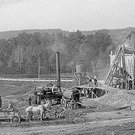Zoning department should change its strategy to make more unified community
To the Editor:
On Jan. 5, 2021, the Guilderland Zoning Board of Appeals heard a variance proposal for the installation of a storage shed on a parcel of land where development would be restricted due to the minimum size requirement.
The application for this variance request included a provision asking for an option to town sewer and water service should that become available at a later date.
In introducing the proposal, Chairman [Thomas] Remmert referred to the comments of the Albany County Planning Board, one of which was an abject disapproval that any water/sewer service be accommodated.
Neighbors who spoke up during the public-comment period raised issues with the proposal and in particular with the water/sewer inclusion, concerned about its fairness and what it might portend for the actual intent of what would be built on the undersized parcel.
When the hearing was continued on Feb 16, 2022, the applicant’s representative spoke to this specific matter when the concerns were presented. He stated, “Upon the suggestion of the woman who helped me with the form when we picked it up, she suggested that we put in the rights to water if it ever came down that road. The only reason we put that in there was because it was suggested.”
The individual expressed genuine misgivings about how this addition had sparked concerns for the neighbors and having had no designs on it to begin with was more than amenable to ensuring that it would not be pursued.
On March 2, 2022, a public hearing was held in connection with a variance proposal for allowance of an excess of signage for three new businesses being developed on a parcel of property at Osborne Corners in Guilderland.
Chairman Remmert said the proposed variance was the largest overage request for signage that he had seen in his tenure on the board.
Discussion from the board conveyed clear objections to what was presented and an array of thoughts strategizing a proposal less exaggerated.
Chairman Remmert commented on the practice of the zoning department to “have people put in their applications for what you want to ask for and we’ll see what happens. We’ll throw it up and see what sticks.”
The meeting ended, after close to two hours, with a recommendation to come back with a revised request.
The implications in both of these cases bring into question what appears to have become the norm in the process for seeking relief from the town code in the form of variances.
Indeed, the process is in place because there are circumstances where such departures are justified. Those circumstances are clearly defined and it is the responsibility of the zoning board to arbitrate them.
When requests are enhanced beyond the applicant’s intentions or there is no effort to encourage applicants to even attempt compatibility with what has been established as appropriate, it is not only wasteful of time and energy but steers the engagement into an adversarial process.
We have seen what has become of the process, pitting developers against residents, neighbors against neighbors, and presenting the zoning board with the additional challenge of having to mediate inflamed emotions.
It has been said that there are people who seem to be opposed to any variance proposal that comes before the board. Perhaps this is the reason why.
The practice for the zoning board to be presented with a first-run overreach, comes with an underlying expectation that there will be objection, followed by an opportunity to come back with a more reasonable variation.
Why would you not expect opposition from a concerned public considering the same inflated request?
Perhaps in place of the current strategy, which seems to be to see how much you can get away with, we could look at a process where applicants for variances are guided to look for measures that could make them be as compatible with codified standards as they can reasonably be.
If that were how the conversation started, it would go far towards making us a truly unified community supporting positive growth and development for Guilderland.
Iris Broyde
Guilderland
Editor’s note: See related story.
